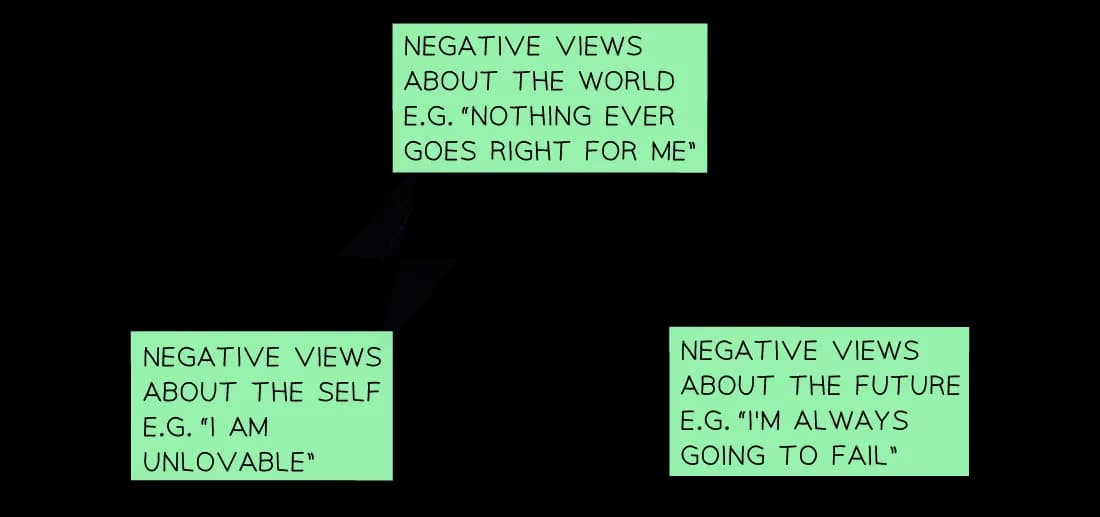Syllabus Edition
First teaching 2017
Last exams 2026
Cognitive Approach to Explaining Depression: Beck's Negative Triad (AQA A Level Psychology): Revision Note
Exam code: 7182
Beck's negative triad
The cognitive approach to explaining depression (Beck, 1967) involves the role of internal mental processes in determining behaviour
Thoughts, information processing and perception are examples of internal mental processes
Irrational thoughts, faulty information processing and distorted perceptions thus forms the cognitive approach to explaining depression
The cognitive approach to explaining depression assumes that depression is a result of faulty or irrational thought processes and negative schema
Faulty information processing
Faulty information processing includes:
irrationally personalising the world and events that happen to them e.g.
‘The world hates me, even the bus hates me, it didn’t stop for me this morning’
seeking out the negative in any situation e.g.
‘I may have got a promotion but it will mean I have to take on more work’ (an example of negative automatic thoughts)
catastrophising e.g.
‘I got a low mark for this essay which means I’m going to fail my exams and end up homeless and broke’
overgeneralising e.g.
‘I had a date last night but it didn’t go well so what’s the point of dating at all?'
The negative triad
Beck (1963) developed an explanation of depression known as the negative triad
The negative triad is divided into the following:
Negative view of the self: I am worthless/ unimportant/ useless/ a waste of time
Negative view of the world: Everyone is against me
Negative view of the future: I am never going to amount to anything

Negative self-schema
Negative self-schema are also a component of Beck's cognitive theory of depression:
A schema is a shortcut that acts as a mental framework which people use to organise their ideas and experience of the world into easily-categorised 'packets' of information
A self-schema is the framework of information an individual has about themselves e.g.:
'I am worthy of love'
'I am not worthy of love'
Depression involves the development of a negative self-schema which results in an individual only focusing on the negative, undesirable aspects of themselves
a depressed person may develop an ineptness schema, believing they will fail at everything they try
a depressed person may develop a negative self-evaluation schema, constantly reminding themselves of their own worthlessness
Evaluation of Beck's cognitive theory
Strengths
Beck's theory has good application for treating depression, e.g.:
CBT (Cognitive Behavioural Therapy) is used to identify, challenge and change irrational thoughts so that depression symptoms recede
this is a strength of the theory as it demonstrates its external validity i.e. it can be used in real settings to help real people suffering from depression
There is strong supporting evidence for Beck's theory:
Grazioli & Terry (2000) found that pregnant women who showed vulnerability for depression were more likely to suffer post-natal depression than those without that specific diathesis
this means that the cognitive approach could be used to identify vulnerability in people and trigger interventions to delay or prevent the progress of depression
Limitations
Beck’s theory is useful for highlighting what characterises irrational thinking but not why such thoughts occur, or where they come from
The above observation means that Beck's theory lacks explanatory power
Beck’s theory does not consider the influence of biological factors in depression
There is ample research which indicates that genetics and neurotransmitters (particularly serotonin) play a key role in the development of depression
this means that Beck's theory does not take a fully holistic approach to explaining depression, viewing it as cognitive only

You've read 0 of your 5 free revision notes this week
Unlock more, it's free!
Did this page help you?